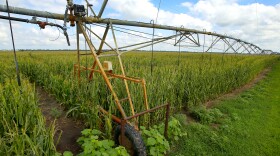-
Biofuel leaders say the shipping industry could be a golden goose for ethanol and soy-based biodiesel. One of the big barriers is the Trump administration, which torpedoed a global agreement to reduce pollution.
-
The U.S. Department of Agriculture plans to send “bridge” payments to farmers who grow soybeans, cotton and other crops before March. Commodity groups and economists say the aid brings relief to farmers and their lenders, but they need long-term solutions.
-
Some family farms in Missouri have added corn mazes to their fields during the fall to supplement their income.
-
Thousands of volunteers in Missouri are trying to get enough signatures to force a statewide vote on a congressional map, which state lawmakers recently gerrymandered to favor Republicans. But state officials aren't making it easy for them. Plus: U.S. farmers are experimenting with short corn. It's corn, but shorter!
-
Kansas has more rural hospitals at risk of closure than any other state. Changes at the federal level are further complicating the situation, leaving hospital officials planning for the future.
-
Farmers rely on the Mississippi River to ship grain and bring them imported fertilizer and other critical inputs. But another year of low river levels means barge travel will be more expensive.
-
Western Kansas has inserted itself into the corn belt, and even though there's better crop options for the climate, huge industries and government subsidies make it hard for farmers to switch. Plus: The average American eats more than 40 quarts of popcorn a year, but the snack isn't grown on that many farms.
-
Western Kansas has inserted itself into the corn belt, a region of the Midwest from Ohio to Nebraska that has dominated corn production. There might be better crop options for the Kansas climate, but huge industries and government subsidies help keep corn growing.
-
The U.S. Department of Agriculture is expecting a strong corn and soybean harvest this year. But low crop prices, high input costs and international trade uncertainty could hurt farmers.
-
Several states, including Missouri, Illinois and Indiana, are in moderate to severe drought. Climatologists say it’s unlikely to let up soon.
-
Scientists and seed companies are working on shrinking corn. The subtle difference in height has led to some big changes in how shorter corn can be planted and managed in the Corn Belt.
-
Scientists in the Midwest and Great Plains were poised to start research to cut U.S. reliance on fertilizer imports, keep biofuel farming cost-competitive and tackle a potent greenhouse gas.
Play Live Radio
Next Up:
0:00
0:00
Available On Air Stations










